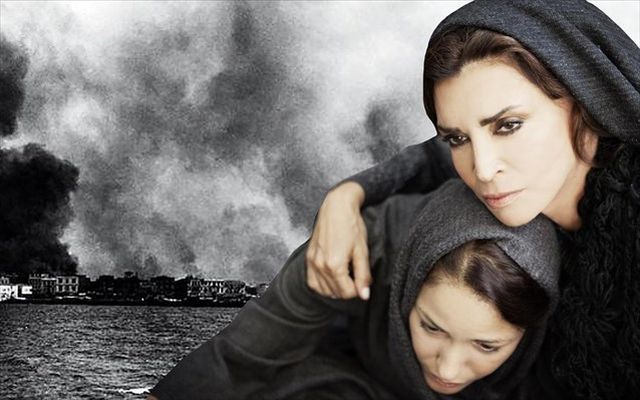From Thursday, 30 October, onwards, the "Hellenic World" cultural centre will present a super production of the Foundation of the Hellenic World, which tells the story of Izmir and of one of the most important periods in the history of new Greece, namely that of the exchange of population between Greece and Turkey, and of refugees, from 1917 to 1923.
The play is called "My favourite Izmir", written and directed by Mimi Denisi, who has carried out complete research devoted to the music of the Ionia area (the area where Izmir is located). The play features rich scenery, costumes from that era, and authentic photographs of the legendary city. The play is a production of the Foundation of the Hellenic World, the purpose of which is to preserve the historical memory and traditions of the country.
After years of study

It took years to research the vast historical data related to Izmir. Mimi Denisi used materials from the rich archives of the Foundation, testimonies of Greeks, Turks, Levantines, over 100 books by historians, travellers, writers, journalists, and ordinary people of the time. She also used materials from unpublished theses and studies, which is why a lot of data related to the dramatic events will become known for the first time to the general public thanks to the play.
The unique life of the cosmopolitan capital of Ionia
Through a family story the play describes the unique life of the cosmopolitan capital of the Ionia district from the time of World War I to the destruction of the city. The cultural society of Izmir comprised by Greeks, Turks, Armenians, Levantines, the unique lifestyle, cuisine and music that harmoniously combine elements of all nationalities, as well as their hidden imbalances, all this passes through the personal stories of the characters. And the political history, opposing interests and political ambitions that had led to the destruction of the famous city stand out behind them.

"We all carry a fraction of Izmir in ourselves"
"They say that in order to write a good work, you should not think about the director and the producer. You need to let your imagination freely lead the hand that writes. I did so while I was writing the work. This is the difficulty I have run into myself as a director!" says Mimi Denisi. "Izmir is a complex work that provokes a lot of emotions, contains a lot of humour, changing pictures, music, songs. This is a family story that is part of the great history of the era between 1917 and 1923. Everything must relate harmoniously, recall as much as possible the unique atmosphere of the lost Greek city that always attracts our imagination. Luckily, I had exceptional actors and collaborators, and especially the "patronage" of the Foundation of the Hellenic World, the founders of which came from this region. I often felt genuine excitement while acting or directing, and I believe viewers will feel the same. This is because we all carry in ourselves a fraction of Izmir, even if we do not come from there. Cities are not buildings, but the people who live in them! Refugees have never returned there, but they have brought Izmir to us and have made it part of our hearts."

With the dream of the Great Idea
The female character of the work, Filio, is a rich woman from Izmir, who remembers the life there with nostalgia. Her mind travels from the refugee neighbourhood, where she is now living, setting off to the cosmopolitan Izmir to relive the golden period of the city, when it was to all the Oriental Pearl, the Paradise of Ionia and the city of infidels to Ottomans.
Filio’s husband, a fanatical Greek and supporter of Eleftherios Venizelos, her father and her children live with the dream of the Great Idea. Her brother and his family, also successful traders, monarchists and fanatical supporters of Asia Minor, want autonomy for Izmir. The relations between the two families, the harmonious coexistence with Turks and Levantines, the unfulfilled forbidden love between peoples, their songs, dreams, entertainment, are at the heart of the work. In the foreground, however, we see historical events that have an indirect impact on the lives of all, from the coming of the Greeks to the destruction of the unique city and the forceful expatriation.